- Home
- Neal Stephenson
The Mongoliad: Book Three Page 33
The Mongoliad: Book Three Read online
Page 33
“Boy,” Ernust said. “Are you hurt? You came running in here so fast, it was if the Devil were...” He dismissed the rest of his observation. “Are you hurt?” he repeated.
Hans shook his head.
“Yesterday...” his uncle began. The portly man sighed, at a loss for how to finish his thought, and ran his hand across the rounded dome of his head. His eyes flicked over Hans—head to toe and back—and the boy read all the unspoken words in his uncle’s restless gaze. “It is time to go, Hans,” he said. “There is nothing left for us here, and the Mongols won’t wait for the mob to find its strength. They’re going to ride out—soon—and kill all the knights. Not just the Rose Knights—though they will be first—but every man who can possibly lift a sword. It will be just like—”
“A Livonian killed him.” Hans barely recognized his own voice—flat, echoing with exhaustion. He wanted to lie down beside the tree and cover himself with one of the dusty blankets used by the Rats. He wanted to lie down and let the bleak despair of his words flow throughout his body. Let it fill him until he drowned. “Not one of the Mongols. He was killed by one of us.”
“No, boy,” Ernust said sadly. “They’re not like us. None of them are. They fight for their own causes, for their lords and at the whims of their lords. Never for us. We are nothing to them. We board their animals. We feed them. We give them shelter. We care for them, and they do not think of us. They think only of themselves.”
“Andreas didn’t,” Hans countered.
Ernust shook his head. “The others are preparing to leave. There will be no one left to drink our brews—no one who will give us coin for it, anyway. We have to go with them. Back to Löwenberg.” He let loose a hollow laugh. “Not that we’ll be safe there for—”
“I’m staying,” Hans said, tightening his arms around the tree. His fervor surprised him, as did his certainty.
His uncle’s face lost its doughy softness, and he fixed Hans with an intent stare that was supposed to be intimidating. “He’s dead, Hans. I know he offered to take you with him, but he can’t. And the rest won’t keep his word. If they even survive. We have to survive, and that has little to do with waiting for a hero to rescue you.”
Hans flinched at his uncle’s words, but his initial reaction passed quickly, and he stared silently at his uncle. Ernust sighed, and ran a hand across his head again, looking down after at the smear of dirt and blood on his palm. Neither said anything, and the narrow sanctuary filled up quickly with a portentous silence.
His uncle was a prudent and savvy man, the sort who could see past the tragedy of the Mongol invasion and realize the opportunities present in the ragged tent city of Hünern. During his short stay with Ernust after his mother’s death, Hans had heard stories about why his uncle had left the family enclave in Legnica for the untrammeled landscape around the new settlement of Löwenberg. The forest needed to be cleared, fields planted, and houses built: all thirst-making work. The same was true for Hünern, albeit work of a bloodier sort. And what his uncle said was true: the brewers—as well as the carpenters, millers, smiths, leatherworkers, cooks, whores, and all the rest—served at the whim and mercy of the knights. When the knights were gone, the rabble dispersed as well.
Think of the living, boy.
Why wait? This was his uncle’s sensible suggestion. There was no shame in leaving. They weren’t combatants. They were merchants, brewers of ale and spirits. The market in Hünern was drying up. Why wait to be the last to leave?
Andreas’s face came to Hans. Not the gap-mouthed rictus nailed to arena wall, but the calm visage that the Rose Knight had worn as he had walked onto the sand. The knight had not been afraid. He knew his duty, and he approached it with honor. In the end, when he had turned his back on the Livonian to throw his spear, he had not hesitated. He had not fled. He had not turned away from his true purpose.
“No,” Hans said quietly. “I can’t leave. They need me.”
Ernust closed his eyes. Overhead, the sun slipped out from behind a cloud, and the tree’s shadow reached across the sanctuary, the branches seeming to grab for his uncle’s feet.
“You’re daft, boy,” Ernust said, squinting at Hans. “Who needs you? The knights? They already know they are in danger.”
“The others—the ones the Khan keeps in cages—I can help them.” I need to help them.
“What can you possibly do?” Ernust asked.
He had had a lot of time to think about what Kim and the Rose Knights were up to. The messages passed back and forth had been purposefully cryptic, but it had been clear to him that their plan was to defeat the Mongols. He wasn’t sure how killing the Khan would have accomplished that goal. As important as Onghwe was, he was only one man; the rest of the Mongols wouldn’t simply run in terror if their Khan died.
“The knights are going to fight back,” he explained. “They don’t have any other choice. They won’t run. It is not in their nature to run.”
Ernust raised his shoulders and sucked at his teeth. “That is why they’ll die,” he said with some frustration. “That is why everyone will die. That is why we have to go.”
“But they’re not alone,” Hans said. “They have allies.” He smiled. “Friends who can strike at the Mongols from behind.”
“No,” Ernust shook his head, understanding what Hans was suggesting. “You can’t do that, boy.”
“I have to,” Hans insisted. “Otherwise—” his voice broke, and he shook his head angrily. “I can tell them where the cages are. I can tell them how to free their friends.”
The city was eerily quiet. The aftermath of the riot following Kristaps’s fight with the Shield-Brethren had imbued the entire settlement with the gravid sense of an impending storm. A stillness hung over every street, ramshackle house, and building like a smothering blanket. Even the priests and monks remained hidden as he and his men had stopped by the church to retrieve the terrified Father Pius.
It would not do to find himself unable to communicate with the Khan’s commander when the need was most great.
They did not reach the Mongol compound. Dietrich heard the horses coming before he saw them, felt his own steed stir at the vibrations that were sent through the earth when many hooves pounded it in unison.
The Mongol host flowed through the streets like water around rocks, blending together in a mass of maille and lamellar-armored bodies, the fletching of innumerable arrows protruding from quivers in a plethora of varying colors. Dietrich also saw spears and curved swords, as well as many, many faces glaring at the four of them with naked hatred.
Dietrich raised his arms away from his weapons as they approached and quietly instructed Burchard and Sigeberht to do the same. Pius trembled beside him, and he hissed at the priest, telling him to remain still. “Translate what I say,” he instructed.
Tegusgal rode at the front of the host, a tall banner rising from the back of his saddle. His lamellar armor was painted red, and around his neck was a thick necklace of gold links, the only marking that distinguished him from the mob of mounted warriors.
“I am not your enemy!” Dietrich called across the open space between them, and he waited nervously, his right palm itching to touch his sword hilt, as Pius stuttered a translation.
Tegusgal stared flatly at Pius, giving no indication he had understood the priest’s words. Pius started muttering under his breath, a Latin prayer, and just as Dietrich was about to command him to be silent, the Mongol commander responded.
“He says that with so few men, you could hardly hope to be,” Pius translated. The priest swallowed heavily as Tegusgal continued. “He asks if you have come here to beg for your life with more gold.”
Dietrich refused to be riled by the comment, even though he felt a somnambulant sense of pride struggle to awaken in the back of his mind. “Tell him I have something of infinitely greater value,” Dietrich said. “I know he rides to battle with the knights. But does he know which are the ones he seeks?”
Tegusgal
laughed when he heard the priest’s words, and his men guffawed and howled with laughter in the wake of his response.
“He doesn’t care,” Pius said. “He says you are all going to die.”
Dietrich smiled. “God willing,” he said with a nod in Pius’s direction. “But not today.”
Pius hesitated.
“Tell him,” Dietrich thundered.
Shivering, Pius stuttered a translation of Dietrich’s words, crossing himself as he spoke the words.
Tegusgal rose up his stirrups, his face darkening, and several of the warriors in the first rank behind him reached for their bows.
Dietrich lowered his hands, resting them on his saddle. He waited, impossibly patient, a tiny smile on the edge of his lips. Burchard’s horse nickered nervously, and the big Livonian made a tiny noise with his lips to calm the animal.
Finally, after an eternity of staring at each other, Tegusgal barked a short question.
“He wants to know why,” Pius translated.
“Because I know his Khan is angry at him. The Shield-Brethren knight nearly slew his master. He failed to protect his liege, and he’s out here today with”—Dietrich ran his eyes over the host of Mongols, trying to get a quick count, and giving up after a few moments—“with more men than he needs to curry some favor.” He waited while Pius translated, and before the Mongol commander could reply, he continued. “He needs to slay the Shield-Brethren first, otherwise his Khan will know that he doesn’t know who is the real threat. Tell him that I can show him where the Shield-Brethren are. I can tell him how they hide themselves. I can tell him about their sentries, about their fighting techniques, about how they’re waiting to ambush him.”
Father Pius’s voice droned in the morning air, filling the space between them with words that Dietrich could not understand but hoped were the ones that he had spoken. Everything rested upon this opportunity. I must not waste it.
Abruptly, Tegusgal snapped his fingers, cutting Pius off. His spoke savagely in response, angrily gesturing for Pius to translate.
“He wants to know why he should trust you. You are betraying your own people.”
“They aren’t my people,” Dietrich said. He leaned forward. “Were the actions of my man in the arena not clear enough?”
Tegusgal regarded him coldly as Pius translated. The Mongol commander grunted as the priest finished, and glancing over his shoulder, he said something to the men behind him.
“What did he say?” Dietrich demanded.
“I—I don’t know,” Pius responded.
Tegusgal spoke again, and with a gulping hiccup, Pius translated, his voice quivering. “What do you want?”
“Safe passage for my men,” Dietrich said without hesitation. “Kill all the knights you want, but me and my men are leaving this shithole.”
“Hai!” Tegusgal barked when Pius finished translating, and before any of the Westerners could react, four Mongols raised their bows and loosed arrows. Dietrich flinched, but the arrows were not intended for him.
Sigeberht fell back, toppling off his mount without a word, and Dietrich caught sight of an arrow jutting from his left eye socket. Another was buried in the maille around the base of his throat.
Burchard groaned and leaned forward, remaining—for the moment—in his saddle. He fumbled with a pair of Mongol arrows—both had struck him high in the chest—and tried to speak, but all that came out of his mouth was a spatter of dark blood. His hand slipped, leaving a red smear across his horse’s mane, and then he too fell to the ground.
Tegusgal spoke, and Pius translated, his voice a quavering whisper. “He’ll kill all the knights he pleases. It is not for you to tell him otherwise.”
Dietrich ground his teeth and stared at the Mongol commander. His hand drifted toward the hilt of his longsword, and a number of Mongol bows creaked as their owners drew them back.
Tegusgal held them off with a raised hand. He spoke again, his voice brusque and commanding.
“He will consider your proposal,” Pius whimpered, “While you show him the camp of the Shield-Brethren. Should he be victorious there, he may grant you—”
“What?” Dietrich demanded as Pius faltered to a stop.
“He may grant you a head start,” the priest wailed.
CHAPTER THIRTY-THREE
Graymane’s Ride
The striking difference between a normal night’s rest and the camp being constructed in the valley beneath Burqan-qaldun was the frenzy of the preparations. Jachin had watched the proceedings for a little while but had grown quickly bored by the monotony and had returned to the warmth of her nonmoving ger. Lian remained outside, happy to have an excuse to remain free of Second Wife—for a little while at least.
Since her conversation a few days prior with Chucai, the freedom she had been enjoying in moving around the camp had become tainted with uncertainty—an effect she was certain Chucai had considered in the course of his chat with her. She had served with Master Chucai long enough to be fully aware of his predilection for manipulating people—she had even taught him one or two tricks—but that didn’t make being the recipient of his machinations any easier. More so when he spoke truly, without the sort of slippery guile that he normally employed when trying to get people to do what he wanted. She suspected Chucai’s true intimation in their conversation about the frog and the stone was not that the stone would swamp the frog—it was an amphibian, after all, and could survive being dunked in water—but that the sudden weight of the stone would strip away the frog’s hiding place. She would be exposed—bait meant to entice a predator. In this case: Munokhoi.
She recalled the incident with the drunk guards in the alley. She had been able to put them off with the warning that she was protected by someone powerful in the Khagan’s court, but that protection was only valid if the men threatening her concerned themselves about repercussions for their actions and if that protective shield was actually true. If she lost Chucai’s protection, then what would stop Munokhoi from assaulting her? In fact, given the animosity between the Torguud captain and Gansukh, she feared Munokhoi would relish assaulting her as it would provoke a reaction from Gansukh. Such a reaction would be the only excuse he’d need to get into a deadly fight with the Khagan’s young pony.
Lost in thought, she wasn’t aware of the approach of another person until a hand around her waist from the left. She jumped at the sudden touch and found herself reacting in a way that Gansukh had taught her—right thumb on the back of the stranger’s hand, grabbing the edge of the fingers with hers and twisting up and out as she spun sharply to her left. As she spun around, raising her arm, she recognized the man who had snuck up on her.
“Ah!” Gansukh’s mouth was twisted, caught between trying to smile and holding back a grimace. He brought his right hand up to her neck in a mock counter—a real warning that she was hurting him. “I should have never taught you that wrist lock,” he said, massaging his wrist after she let go.
“No, having taught it to me, you should have known better to sneak up on me like that.” She punctuated these last two words with a finger to Gansukh’s chest.
Gansukh laughed, pretending to be physically shaken by the force of her strident poking. “Ah, what’s a little rough contact between—” He paused, reading something in her expression. “What is it?” he asked, his tone losing its levity.
“Nothing,” she said.
He caught her hand as she tried to withdraw it, and pulled her toward him. She minced forward, letting herself be dragged close. “I don’t believe you.” He touched her hair lightly, his hand hesitating—wanting to stroke her head, but not wanting to be so affectionate in public. “I haven’t seen you for several days.”
“I know. Second Wife has been in need of company, and Chucai asked me to report on her moods.”
Gansukh smiled. “And he needed you for that? I could tell him her moods. Anyone could tell him her moods.”
Lian fought the urge to smile. “Also, as long as I am w
ith Jachin, I am...” She wrestled momentarily with telling Gansukh what had been on her mind right before he had grabbed her. She fought the urge to lean into his touch—to let him hold her. “It’s... Munokhoi,” she said.
“Ah, I see.” Gansukh nodded, a thoughtful expression tightening his face. “Has he threatened you?”
Lian shook her head. “I haven’t see him, but I know he hasn’t forgotten what happened during the Chinese raid.”
“He is to be relieved of his command,” Gansukh said. He moved to Lian as he spoke, his voice dropping to a conspiratorial whisper. “I don’t know when it is going to happen, but I suspect it will be soon. And when he is stripped of his rank, he will no longer be protected by the rules of the Torguud.”
This was all the confirmation she needed for her suspicions. Without the rules of the Torguud mandating his behavior and protecting him from reprisals, he would be even more liable to seek revenge for the injuries done to his reputation. “Are you...?”
Gansukh shook his head, a hard smile pulling back his lips. “Do you take me for a scared boy from the steppes?” he asked, mock outrage in his voice. There was a gleam in his eyes, an excitement that was equally frightening and thrilling to see.
“Staying with Second Wife is a good idea. It puts you out of harm’s way,” Gansukh continued, trying to soothe Lian’s fears. Trying to pretend that he hadn’t revealed the hunter’s delight in his heart.
She felt a momentary pang of guilt as relief washed over her. She didn’t need to be the bait that drew Munokhoi out. She didn’t have to put herself in danger.
Gansukh was already planning on hunting Munokhoi. He knew what had to be done, and he had no reticence about doing it.
A commotion beyond the nearest rank of ger gave Lian an excuse to break away from the confusing elation and horror brought on by this train of thought, and they separated to a more discrete distance as they hurried through the ger.

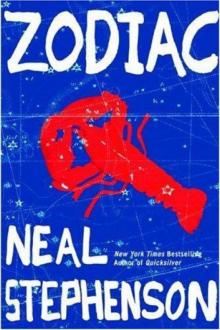 Zodiac: The Eco-Thriller
Zodiac: The Eco-Thriller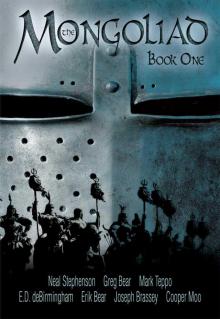 The Mongoliad: Book One
The Mongoliad: Book One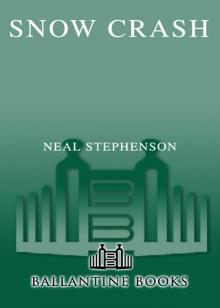 Snow Crash
Snow Crash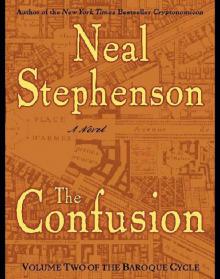 The Confusion: Volume Two of the Baroque Cycle
The Confusion: Volume Two of the Baroque Cycle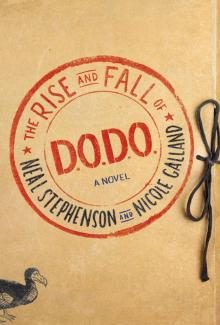 The Rise and Fall of D.O.D.O.
The Rise and Fall of D.O.D.O.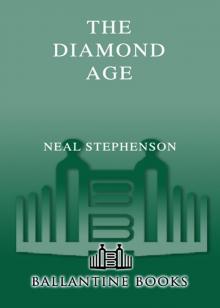 The Diamond Age: Or, a Young Lady's Illustrated Primer
The Diamond Age: Or, a Young Lady's Illustrated Primer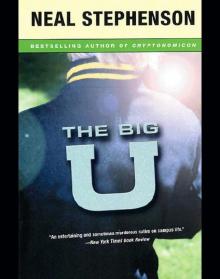 The Big U
The Big U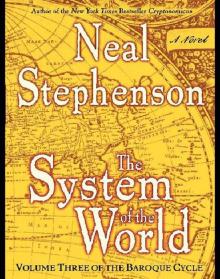 The System of the World: Volume Three of the Baroque Cycle
The System of the World: Volume Three of the Baroque Cycle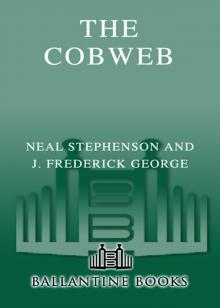 The Cobweb
The Cobweb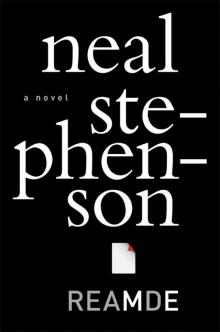 Reamde
Reamde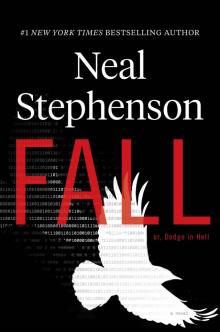 Fall; or, Dodge in Hell
Fall; or, Dodge in Hell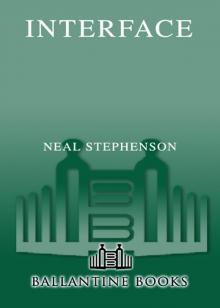 Interface
Interface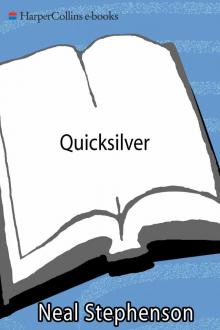 Quicksilver
Quicksilver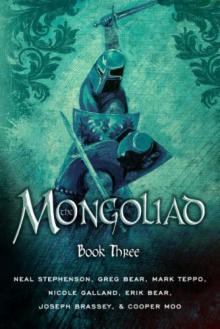 The Mongoliad: Book Three
The Mongoliad: Book Three Seveneves
Seveneves Atmosphæra Incognita
Atmosphæra Incognita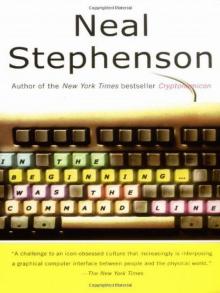 In the Beginning...Was the Command Line
In the Beginning...Was the Command Line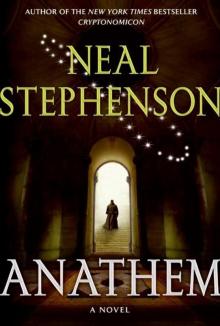 Anathem
Anathem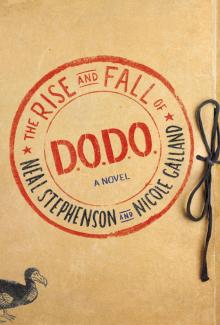 The Rise and Fall of D.O.D.O.: A Novel
The Rise and Fall of D.O.D.O.: A Novel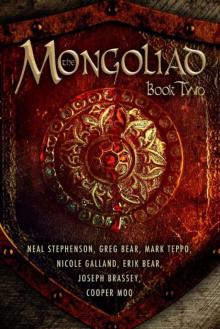 The Mongoliad: Book Two
The Mongoliad: Book Two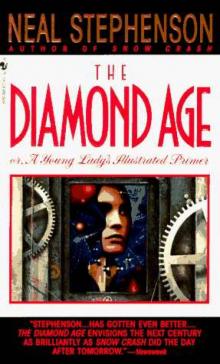 Diamond Age or a Young Lady's Illustrated Primer
Diamond Age or a Young Lady's Illustrated Primer THE System OF THE WORLD
THE System OF THE WORLD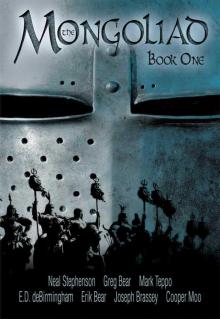 The Mongoliad: Book One tfs-1
The Mongoliad: Book One tfs-1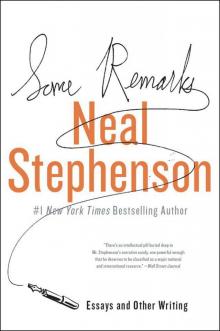 Some Remarks: Essays and Other Writing
Some Remarks: Essays and Other Writing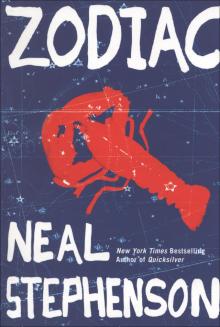 Zodiac
Zodiac Spew
Spew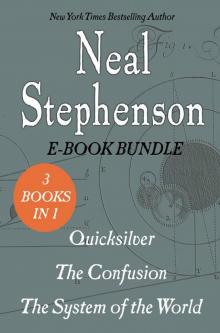 The Baroque Cycle: Quicksilver, the Confusion, and the System of the World
The Baroque Cycle: Quicksilver, the Confusion, and the System of the World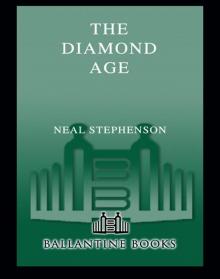 The Diamond Age
The Diamond Age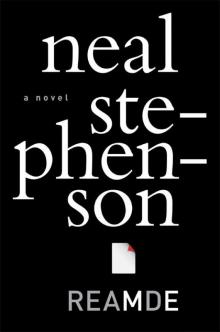 Reamde: A Novel
Reamde: A Novel In the Kingdom of Mao Bell
In the Kingdom of Mao Bell Mother Earth Mother Board
Mother Earth Mother Board Twelve Tomorrows - Visionary stories of the near future inspired by today's technologies
Twelve Tomorrows - Visionary stories of the near future inspired by today's technologies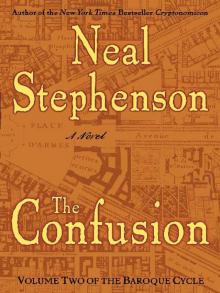 The Confusion
The Confusion The Great Simoleon Caper
The Great Simoleon Caper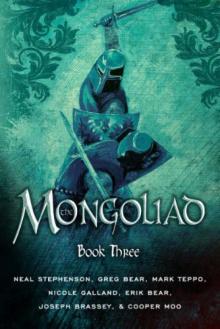 The Mongoliad: Book Three tfs-3
The Mongoliad: Book Three tfs-3